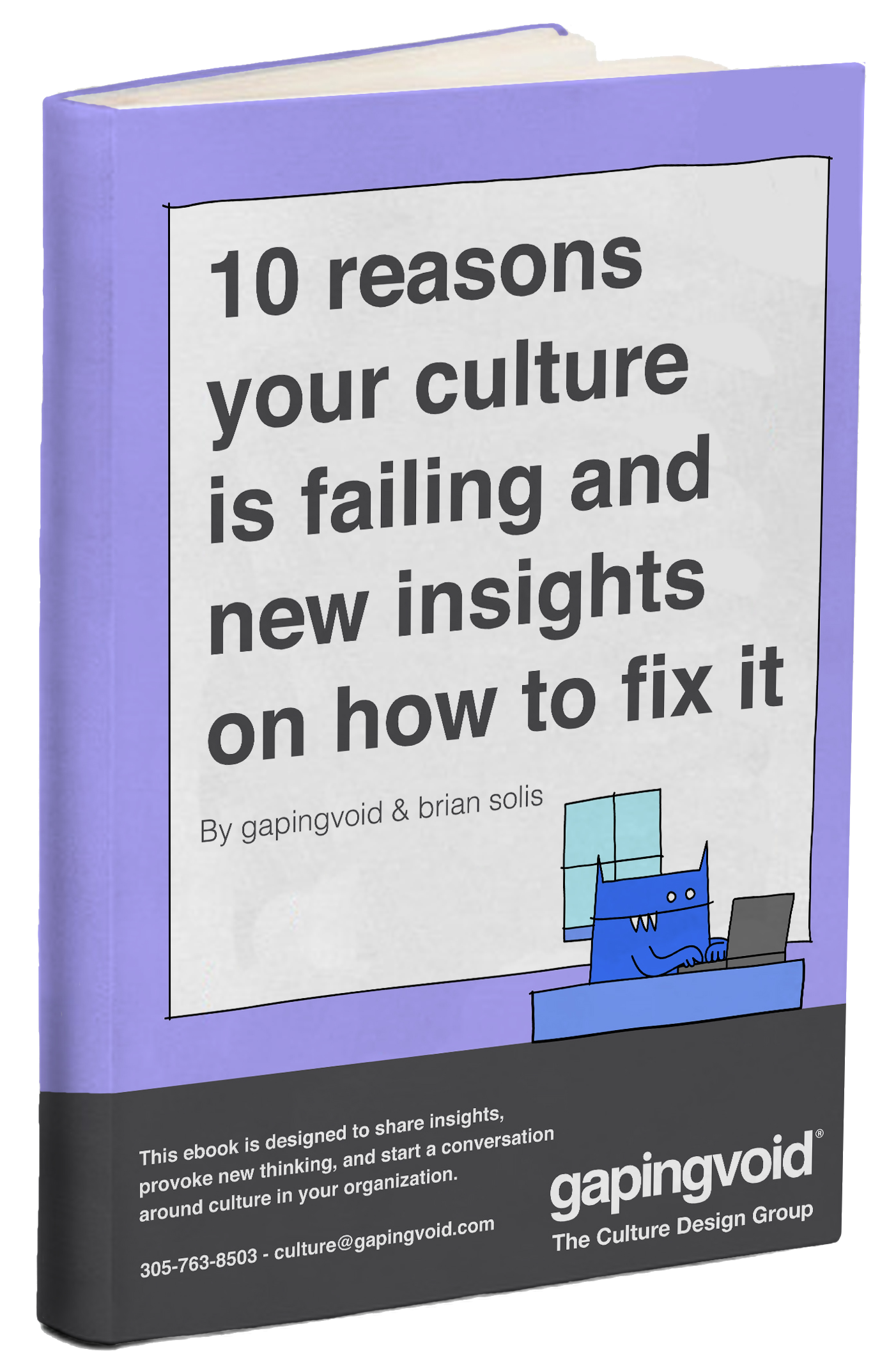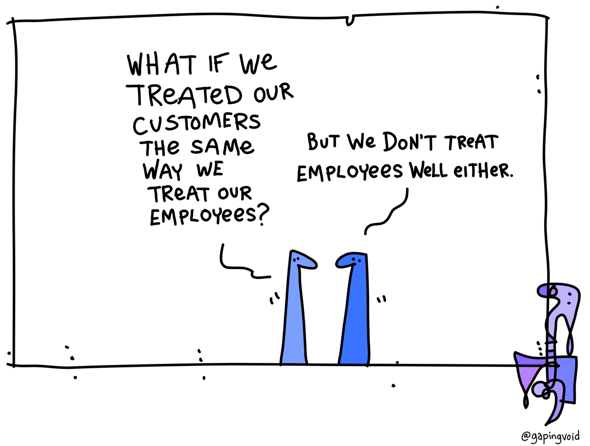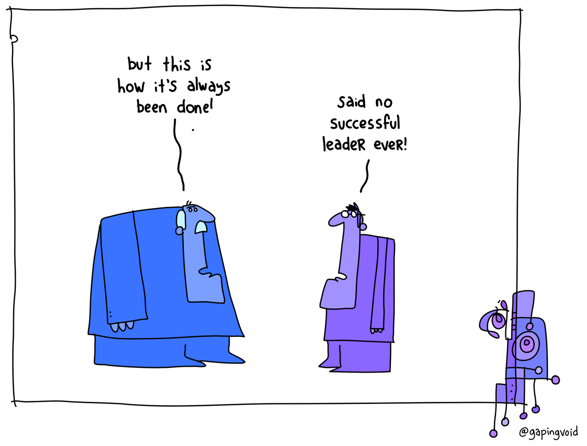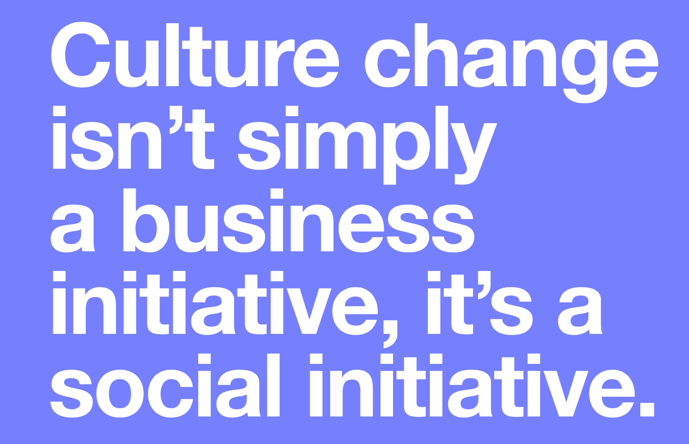After studying customer experience, digital transformation and innovation for so many years, I’ve found that the next big thing in business (r)evolution is culture. The other most interesting thing I’ve learned is that while businesses are readying or investing in change, the definition of meaningful culture is elusive or inconsequential. Yet, company culture is either the number one catalyst or inhibitor to progress. Culture needs a champion. As Peter Drucker once famously said, “Culture eats strategy for breakfast…”
Like most aspects in business, management perspectives, processes and systems are dated. How employees want to work, how they work and the solutions that are being introduced to change work are oftentimes unaligned. At the same time, how employees feel and think about work, their skill sets, values, ambitions and aspirations, are also evolving away from traditional management and human resource philosophies and supporting processes. What’s routinely missed is people, which prevents a human-centered approach to improving culture, employee engagement, and overall competitiveness.
When I speak to executives about culture, many pay it lip service, making sweeping assumptions about how corporate culture is paving the way to success. When I peel the layers back and start getting deeper into understanding and perception of what culture is and isn’t, it becomes clear that company culture is not a byproduct of strategic vision or employee engagement, but instead a manifestation of how companies work to achieve business objectives.
In work, I needed to find common ground for a workable definition of culture to convince executives to prioritize leadership and management and cultures of innovation, digital transformation and operational excellence.
Culture is shaped by the collective experiences of your employees, what they believe, what they value and how they survive. It’s also defined by vision and leadership, how you bring that to life, what you reward and also what you tolerate or overlook.
Culture has never been more important. And the same time, culture has never been more ignored.
According to an eye-opening Gallup poll, 70% of American employees are “not engaged” or “actively disengaged.” It’s estimated that actively disengaged employees cost companies $450-to-$550 billion in lost productivity.
At the same time. Executives and HR underestimate the importance of, or misunderstand the practice of, employee engagement and what’s needed to foster “engagement” that’s valued by employees. In 2016, I conducted a study with Jostle to understand the divide between executive perspective and employee sentiment. We uncovered what we call “the engagement gap” and there’s no way to close it without understanding what employees value, why and how to align them with business objectives.
For example, executives ranked the priority of employee engagement at 8.3 out of 10. But, employees only rated engagement at 5.5. The employee engagement gap also spills over into culture. About 1/2 of employees are actually neutral on their company culture and more than 1/4 felt culture is dysfunctional. That is not only disengaged and unproductive, it also boasts the threat of toxicity.
What’s at the heart of disengagement and uninspired cultures? Many things ranging from the lack of leadership, vision and investment. It’s also a mindset that carries over from traditional business experience. In a recent interview with a Fortune 500 company, I asked why the engagement gap was so significant within their organization.
The answer was as logical as it is emblematic of the deeper problem that requires immediate attention, “We have serious headwinds with demographics. We are not replacing or re-training older executives and employees and their way of working is in the way of progress. The industry needs to embrace an innovation mindset.”
Old ways won’t open new doors. A culture of empowerment, innovation, and reward is the only way to help companies compete for the future. You can’t get there with disengaged employees who don’t have an articulated purpose to rally together around.
Executives need to focus efforts on ensuring that they have a mission that matters and that people can see how their work impacts that mission.
10 Reasons Your Culture is Failing and New Insights on How to Fix It

The culture struggle is real and needs champions to raise awareness, identify problems and to work toward productive solutions. To help, I partnered with GapingVoid, a Miami-based consultancy that helps companies increase employee engagement and connect people more deeply to mission, values and purpose. Together, we released a new, free ebook, “10 reasons your culture is failing and new insights on how to fix it.” It was written for thought leaders and movement makers and is designed to share insights, provoke new thinking, and start a conversation around culture in your organization.
The future of culture and employee experience starts with you.
Please download, read and share!
Please read X, The Experience When Business Meets Design or visit my previous publications
Connect with Brian!
Twitter: @briansolis
Facebook: TheBrianSolis
LinkedIn: BrianSolis
Youtube: BrianSolisTV
Snapchat: BrianSolis
Invite Brian to speak at your next event or meeting.









Hi Brain
Whilst I strongly agree with you, the prevailing objectives of businesses I’ve worked for over the past 10 years engender short-termism and thus undermine the need for a culture; selling the business, attracting the next round of investment etc, often place the emphasis on employees being short term resource.
A self-fulfilling prophecy then prevails where employees have short term objectives to learn as much as they can and use companies as stepping stones in their career.
I have recently worked for a business where the CEO has made it clear he doesn’t believe in mission statements.
I therefore try and encourage a subtle form of “culture” which is based on encouragement and teamwork rather than try and change the board’s approach.
Good luck.
Adam
Sounds great, but also sounds like an overwhelming business rationalization for age discrimination and replacing more expensive older workers with cheaper, less experienced younger ones. Meanwhile, institutional memory and intellectual capital (like now non-existent software specs) are escorted out the door.
But you will make lots of top executives very happy. They just got another excuse to do the odious thing they really wanted to do anyway.